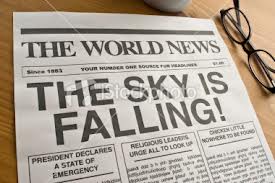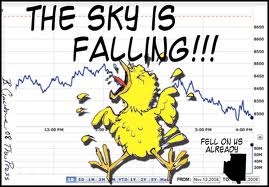 That is it . . . I am fed up and can’t stop myself from saying something that has been on my mind for a little while now. Can non-profit organizations please stop running around and telling anyone who will listen that the economy is bad and the recession is hurting their agency?
That is it . . . I am fed up and can’t stop myself from saying something that has been on my mind for a little while now. Can non-profit organizations please stop running around and telling anyone who will listen that the economy is bad and the recession is hurting their agency?
I hear my non-profit friends (both staff and board volunteers) bemoaning how bad it is and how they’ve been impacted. I know that I’ve heard it at least once a month going back to the 2008 stock market meltdown, which by the way was FIVE YEARS ago.
I totally understand why people were talking about this 12 to 24 months removed from the epicenter, but as I just pointed out more than half-of-a-decade has passed since that time.
The fact of the matter is the recession officially ended in June 2009, according to Cycle Dating Committee of the National Bureau of Economic Research. Don’t believe me? Just go ask Google.
In fact, the Blackbaud Index just arrived in my email inbox, and they are estimating that charitable giving rose 4.9% in 2013. Additionally, online giving increased by approximately by 13.5%.
When I see numbers like these, it always stirs my emotions when juxtaposed against comments such as:
- “The economy is bad and donors just aren’t giving.“
- “We can’t ask people for money while the economy is still doing so poorly.“
- “Our agency hasn’t recovered from the economic downturn.“
- “Our board members are afraid to ask their friends for charitable contributions as long as the economy is doing so poorly.“
Believe it or not, I heard some variation of each of these comments just this last weekend!
At first, I found myself shaking my head and asking the obvious question, “WHY?” However, I quickly stopped that when I realized that I know the reasons why. Here is what I think drives those comments:
- Fear is irrational and people believe what they believe in spite of facts.
- Some parts of the country are taking more time to emerge from recession.
- Some non-profit agencies never adjusted their revenue model and resource development plan to accommodate for what economists are calling “The New Normal“.
- Some non-profit professionals are always looking for excuses to justify poor fundraising performance.
- Some misguided fundraising professionals and volunteers think pleading poverty and pointing at the economy makes for a good “case for support” (which really works the opposite way on how donors perceive your case).
Regardless of whether or not you believe these reasons, the reality is that we need to shake ourselves out of this mindset. Our clients deserve better and whining has never been shown to solve problems.
So, what should you do to combat this mindset? I suggest the following:
- Involve your volunteers in developing a new resource development plan and answering this simple question: “If how we raised money before the recession doesn’t work anymore, then what should we do to secure the resources we need to fund our mission today?“
- Involve your volunteers in developing a new case for support document and build consensus to stop talking to donors about the economy.
- Be the change you want to see in the world and stop talking about the economy.
- Take your volunteers by the hand and go with them on cultivation and stewardship visits with prospects and donors.
- Engage in benchmarking activities and compare your agency’s fundraising performance to other non-profit organizations (e.g. check out Blackbaud’s performance comparison tool by clicking here).
What are you doing to combat this insidious, self-defeating mindset that is still pervasive in many non-profit boardrooms? Please use the comment box below to share your thoughts and experiences. We can learn from each other.
On a side note, before you take me to task with comments about my insensitivity, please know that I know there are people out there who are still hurting. I have never said there weren’t. In fact, I know some of those people, and I am sure you do, too. However, the reality is that non-profits cannot wait until there is no more unemployment. Our agencies cannot wait until economic indicators are back to the ridiculous 1990s levels. Those who wait for that to occur won’t be in business for much longer. Let’s rediscover that often-celebrated “American spirit” of picking ourselves off the ground and doing the hard work to get our agencies moving again.
There! I’ve said it . . . now please feel free to excoriate me. 🙂
Here’s to your health!
Erik Anderson
Founder & President, The Healthy Non-Profit LLC
www.thehealthynonprofit.com
erik@thehealthynonprofit.com
http://twitter.com/#!/eanderson847
http://www.facebook.com/eanderson847
http://www.linkedin.com/in/erikanderson847

 When I hear one donor say something once, I chalk it up to something interesting. When I hear two donors say the same thing, I usually think it is an interesting occurence. However, when three or more donors express the same sentiment, I sit up . . . take notice . . . and treat it like a potential trend.
When I hear one donor say something once, I chalk it up to something interesting. When I hear two donors say the same thing, I usually think it is an interesting occurence. However, when three or more donors express the same sentiment, I sit up . . . take notice . . . and treat it like a potential trend. While fear is irrational, it definitely impacts human behavior. I believe most students learn this in Psychology 101. So, if people “think” the sky is falling, it is falling regardless of the facts.
While fear is irrational, it definitely impacts human behavior. I believe most students learn this in Psychology 101. So, if people “think” the sky is falling, it is falling regardless of the facts. Here are a few quick tips you may want to remember when jumping into these discussions:
Here are a few quick tips you may want to remember when jumping into these discussions:

